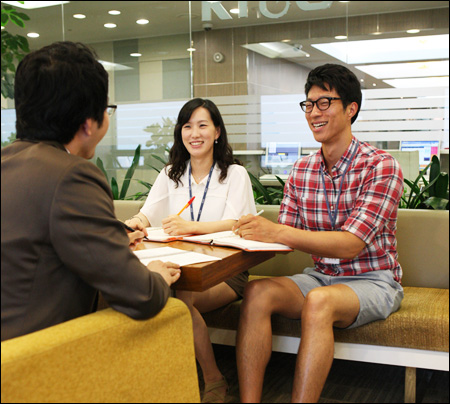‘Cool-biz’ dress code in vogue

KT&G employees wearing shorts and sandals talk with a business partner in a lounge at the company headquarters in southern Seoul, Thursday. / Courtesy of KT&G
Japan initiated the current global trend for the “cool-biz’’ dress code as part of its efforts to reduce electricity consumption, following an explosion at the Fukushima nuclear power plant early last year after an earthquake triggered a tsunami.
Since the incident, the Japanese government has shut down all nuclear power plants, causing chronic electricity shortages across the country.
The idea behind cool-biz attire is that if workers wear only shorts, short-sleeve shirts and no jackets and ties, demand for air-conditioning will reduce.
Facing a probable electricity shortage this summer, which is widely expected to be one of the hottest in recent years, both the government and private enterprises here have quickly followed suit encouraging employees to dress casually.
Among government agencies, Seoul Metropolitan Government took the initiative on June 1 by allowing public servants to wear shorts and sandals in the office through August. But still those who deal with citizens in person or meet people in a business situation are encouraged to dress formally.
The city government also signed a memorandum of understanding with district governments, civic groups and private firms to encourage people to join the energy saving campaign.
“In the past, employees had to wear a suit in summer, which was said to have reduced worker productivity. But this year, they can work dressed casually,’’ a Seoul city spokesman said. The city expects the casual dress code will help lower office temperatures by 1 to 2 degrees Celsius.
Fearing a repeat of the nationwide rolling blackout last September, that affected over 6 million households and businesses, high-ranking bureaucrats are also taking part in the cool-biz movement.
On Tuesday, President Lee Myung-bak and ministers attended a Cabinet meeting in short sleeves in an effort to save energy.
Businesses striving to cut utility costs
Samsung Group, KT&G, Korean Air and many other companies have jumped on the bandwagon to deal with higher electricity costs ahead of the peak summer season.
In May, Korea Electric Power Corp. (KEPCO), the state-run electricity supplier, asked the government to allow it to raise utility bills by an average of 13.1 percent to improve its worsening balance sheet and help reduce power consumption.
In response, the Ministry of Knowledge Economy has hinted at upping electricity charges by more than 5 percent soon, despite concerns over growing inflationary pressure. Utility charges were raised twice in August and December over the past year.
KT&G said Thursday that it will join Seoul city’s cool-biz movement, permitting employees to wear shorts and sandals. It is the first time the country’s largest cigarette maker has liberalized workplace dress codes since it was established in 1987.
“Workers have responded positively to the casual dress code, saying they can work more efficiently. They also say the cool-biz fashion helps turn down air-conditioning,’’ a KT&G spokesman said. “Employees will also turn off lights during lunch hours and refrain from using paper. Our electricity saving campaign will help lower utility bills and improve our corporate image.’’
Samsung Group, the country’s largest conglomerate, also launched a group-wide “save power’’ campaign on May 30, which will continue through September. The movement aims to slash electricity consumption by 5 percent in manufacturing plants and by 10 percent in offices.
“We have lessened air-conditioning at workplaces. Instead, we allowed employees to take off their jacket and wear shorts,’’ a Samsung Group spokesman said.
The conglomerate also said employees are required to turn off computers during lunch hours and after leaving the office, stressing it will actively participate in the nationwide power-saving campaign.
The country’s two flagship flight carriers ― Korean Air and Asiana Airlines ― have also adopted the casual dress code, which is surprising for business-to-consumer companies.
Korean Air said early this month that employees do not have to wear a tie from June to September. “Studies show that body temperatures fall by about 2 degrees Celsius without putting on a necktie. This will help use save energy in summer,’’ a Korean Air spokesman said.
But pilots, flight attendants and employees dealing with customers in person are still required to dress formally.
Asiana Airlines allows employees to leave their ties at home from June 1 to Sept. 15. “We introduced cool-biz attire in June 2008 to reduce the emission of carbon dioxide and raise worker productivity. But cabin crews and employees in customer service departments still need to follow a formal dress code,’’ the company said. <The Korea Times/Lee Hyo-sik>



















































